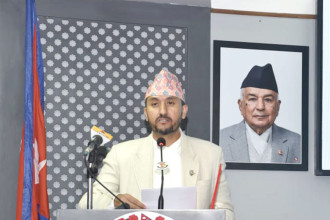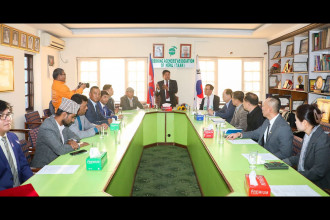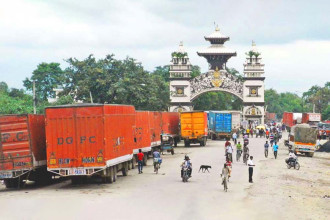-1716527584.jpg)
KATHMANDU: The trade partnership between Nepal and India is characterised by the exchange of a wide array of goods and services, ranging from agricultural products and industrial goods to tourism and education services. India is Nepal's largest trading partner, with a significant portion of Nepal's imports coming from India. The open borders and tariff-free access between these two nations have further facilitated trade, allowing goods to move relatively freely. However, this trade relationship has faced occasional challenges, including border issues and transit challenges. The India-Nepal trade partnership remains a dynamic and evolving aspect of their broader bilateral relations, representing opportunities for economic growth and subregional integration.
Against this backdrop, under the aegis of its Bilateral Think Tank “India-Nepal Centre” and “Gati Shakti Development Forum” and in association with the Federation of Nepalese Chambers of Commerce and Industry (FNCCI), Birgunj Chamber of Commerce and Industries (BiCCI), Nepal-India Chamber of Commerce and Industry (NICCI) and Nepal Chamber of Commerce (NCC), PHD Chamber of Commerce and Industry (PHDCCI) organised the “India-Nepal Multimodal Logistics & Connectivity Summit 2024”. This event, held in Birgunj on May 23 saw wide-ranging participation from the government and industry on both sides.
The summit brought together key stakeholders from both countries to explore, discuss, and catalyse transformative initiatives for enhancing connectivity and trade. The summit served as a platform for in-depth discussions on enhancing logistics, transportation, and connectivity infrastructure between Nepal and India.
At the summit, participants raised various issues such as the need to reduce logistics and transportation costs to alleviate the burden on consumers and to prioritise Nepali companies while granting management custody of Integrated Check Post (ICP) and Inland Container Depot (ICD). This has provided access to Nepali trucks in India, and improved connectivity by introducing high-speed railways to Indian towns.
Atul K Thakur, Secretary, India-Nepal Centre, PHDCCI, focused on the crucial issues concerning trade transit and connectivity while setting the tone of the summit. Ashok Temani, President (Madhesh Province), FNCCI, reflected on the key reforms needed on Nepal's side to avail the benefits of improved services with ICP, ICD and a simplified transit system, as outlined in a manifesto released during the programme.
"Open border and connectivity projects have been major facilitators of India-Nepal trade. In the recent past, important developments like improvement in border infrastructure, enabling of rupee payment, signing of a letter of exchanges bilateral rail service agreement, government-to-government agreement of fertiliser supply from India to Nepal, and progress in bilateral power sector cooperation are likely to further boost bilateral trade," said Devi Sahai Meena, Consul General, Indian Consulate in Birgunj, Nepal.
“Nepal should capitalise on India’s economic resilience and growth,” stated Eshor Raj Poudel, Consul General, Nepalese Consulate in Kolkata, India.
Ashish Gajurel, Executive Director, Nepal Intermodal Transport Development Board, Ministry of Industry, Commerce & Supplies, Government of Nepal, emphasised the need to reduce costs in the supply chain. Sushil Bhatta, CEO of the Investment Board Nepal, spoke about the improvement in connectivity through the progress of transmission lines between Nepal and India and showcased a few promising projects.
Representing the industry, Anil Kumar Agrawal, President of BiCCI; Naresh Kumar Agarwal, Vice President of the Nepal Freight Forwarders Association; and Abhishek Choudhary, President of NICCI Birgunj Chapter, stated that multimodal connectivity is crucial. Atul Kumar Sharma, COO of Pristine Valley Dryport Pvt Ltd, which operates Sirsiya Dry Port, believes that customs formalities need to be simplified and made more efficient. Other key speakers included Jagdish Prasad Agrawal, Chairman of Nimbus Group of Companies; Vishal D Patil, General Manager (Cluster Head-Kolkata) of Container Corporation of India; Bikas Rauniar, Executive Director of Interstate Multi Modal Transport (P) Ltd; Ashok Kumar Baidya, Chairman of Nepal-Bharat Sahyog Manch; Atul Koirala, Board Member of India-Nepal BP Koirala Foundation & Techno-Entrepreneur; Chandra Kishore, Senior Journalist; Dr B P Yadav, Director of Nepal Agricultural Research Council (NARC), Government of Nepal; and Dr Bikas Kumar Rauniyar, Director of Nepal-Bharat Maitri Hospital.
Nepal and India share a significant and multifaceted trade relationship that is deeply rooted in their geographical proximity, historical ties, and cultural affinities. In addition to this, complementarity is a guiding force in their bilateral relations. India serves as Nepal's largest trading partner, with a substantial portion of Nepal's imports originating from India.






